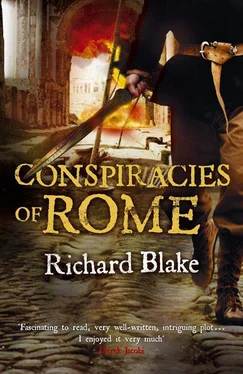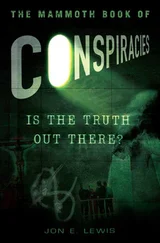Richard Blake - Conspiracies of Rome
Здесь есть возможность читать онлайн «Richard Blake - Conspiracies of Rome» весь текст электронной книги совершенно бесплатно (целиком полную версию без сокращений). В некоторых случаях можно слушать аудио, скачать через торрент в формате fb2 и присутствует краткое содержание. Жанр: Исторические приключения, на английском языке. Описание произведения, (предисловие) а так же отзывы посетителей доступны на портале библиотеки ЛибКат.
- Название:Conspiracies of Rome
- Автор:
- Жанр:
- Год:неизвестен
- ISBN:нет данных
- Рейтинг книги:3 / 5. Голосов: 1
-
Избранное:Добавить в избранное
- Отзывы:
-
Ваша оценка:
- 60
- 1
- 2
- 3
- 4
- 5
Conspiracies of Rome: краткое содержание, описание и аннотация
Предлагаем к чтению аннотацию, описание, краткое содержание или предисловие (зависит от того, что написал сам автор книги «Conspiracies of Rome»). Если вы не нашли необходимую информацию о книге — напишите в комментариях, мы постараемся отыскать её.
Conspiracies of Rome — читать онлайн бесплатно полную книгу (весь текст) целиком
Ниже представлен текст книги, разбитый по страницам. Система сохранения места последней прочитанной страницы, позволяет с удобством читать онлайн бесплатно книгу «Conspiracies of Rome», без необходимости каждый раз заново искать на чём Вы остановились. Поставьте закладку, и сможете в любой момент перейти на страницу, на которой закончили чтение.
Интервал:
Закладка:
He shrugged. ‘But something seems to have gone wrong with the transmission of orders. There was a fight, but no prisoners were taken. Getting any orders obeyed is a constant trouble now His Holiness has taken over most payments. A pity. The people would have appreciated a good show…
‘Now,’ he said, changing the subject, ‘I understand you relieved those barbarians of a large sum in gold.’
I looked up sharply. How could the prefect have known that? I thought of those shifty Syrians at the bank. So much for Maximin’s lecture on the confidentiality of bankers. I only hoped he was right about their honesty.
He continued with a smile: ‘You have nothing to fear on that account. I’ve had no complaints about stolen money. There are no claimants about to demand an enquiry of restitution. You may, of course, make some voluntary gift to my men. If you send it to me, I will ensure it reaches the proper hands. However,’ he paused, ‘I believe there were other objects taken from the barbarians – objects recovered, that is, that may have identifiable owners.’
Maximin broke in: ‘God made us His humble instruments in the recovery of a most holy relic. This, of course, is a matter for His Holiness. I shall see him tomorrow and give the relic directly into his own hands.’
‘Not tomorrow, you won’t,’ the prefect said. ‘Boniface erupted all over a while back in a rash of bleeding sores. Since the relics didn’t work in his case, the doctors have sent him off to Naples for the volcanic mud baths. I doubt he will be back before next month. As the highest civil power in Rome, I will take delivery of the relic. It is intended for the consecration of the new Church of St Mary – that is, for the consecration of the old temple of the demons Jupiter, Venus and Mars.’
He crossed himself, and continued: ‘I have full authority to take possession of all stolen goods that may be recovered.’
‘With respect,’ said Maximin, ‘this is a matter for Holy Mother Church. I have an appointment at the Lateran tomorrow, and will hand the holy relic back into the hands of those whose lawful property it is.’
It was obvious that, whatever fancy title he might have, the prefect had no authority in practice to compel anything. He dipped his finger in wine and traced a circle in the dust that covered his desk. ‘Very well,’ he said at length, in a flat and only slightly disappointed voice. ‘If that is how you want to play, so be it.’
He paused again, then asked: ‘What brings you and your young friend to Rome?’
Maximin explained our mission to gather books for Canterbury, passing me off as a convert of the utmost piety. The prefect shot me a brief but penetrating glance, as if looking for any trace of piety. I looked humbly down, hoping he had seen other than an educated brigand.
‘I think a month from today should be sufficient for your purposes,’ he said. ‘I doubt you will have any trouble gathering all the books you could ever want in this place. I don’t even think the owners will insist on your making copies to take away. And it would be a shame to deprive the furthermost Britons of two such holy and effective missionaries of the Faith.
‘I will have your residence permits sent over to your lodgings tomorrow or the day after. Please note they will not entitle you to receive anything from the papal dole.’
With that, the prefect rose, our audience at an end. As he rose, he knocked over his cup, spilling red wine over a heap of papers. He scowled and brushed them all onto the floor, shattering the cup, and sat heavily down again with his back to us.
12
Our business over, Maximin and I continued deeper into the Forum. This had once been the civil and religious centre of Rome. But times now were altered, and its buildings were no longer in use. Some had fallen down. Most had been locked shut. We passed by the Julian Basilica – big, though far smaller than the place we had just visited. Its great doors were secured with bars and a rusted padlock. As ever, its marble facing had been mostly stripped. The bronze statues that had once been crowded outside were evidenced only by their plinths. I think it was the Vandals who had stripped all the bronze they could carry in their leisurely sack of about a hundred and fifty years before.
It was the same for the Temple of Concord and even the Senate House – this hadn’t been used for generations. The Temple of Vesta we’d already seen. This was an elegant little building – the old temples, by the way, were generally built smaller than churches, which follow the basilica pattern. The reason is that temples were never meant to hold large numbers of worshippers, but housed the cult statues, the main worship taking place in the open. The Temple of Vesta had been broken open, and was in use as a cow shed. Other buildings had fallen down, and I couldn’t identify their function even by the broken inscriptions.
Once or twice, I turned to ask Maximin. He’d known Rome from any number of visits. Sometimes, he’d answer with a firm confidence that I was willing to trust. Quite often, even he was vague about the former uses of these falling or fallen buildings.
‘It was a temple to some demon,’ he said, pointing up at the great Temple of Jupiter that still loomed above us on the Capitoline Hill. ‘As with all the others, it was closed over two hundred years ago on the orders of Caesar. God willing, it may soon fall down – or be turned to some holy purpose. So many were the demons who resided in this city before men were brought to the True Faith of Our Lord and Saviour, Jesus Christ. Even now, they wander the Earth, tempting the unwary to blasphemy or heresy.’
Knowing Maximin as I did, I mastered the urge to sniff. I resolved instead to get him again when he was feeling less devout. Plainly, Rome was in no need of temples. With the decay of power and population, it also had little need of administrative buildings. But it would be nice to know what all these places had been.
It didn’t help that the Tiber had risen in the past hundred years, and the Forum was now regularly flooded. We mostly walked over compacted mud several feet higher than the old pavements.
Just in front of the Julian Basilica, though, the ground had been cleared, and there was a gleaming new column set up with a golden statue on top. About fifty feet up, the statue was a crude lump of bronze. It looked barely human. It made a shocking change from the smooth perfection of the marble statues we’d just seen in the Basilica or still dotted here and there about the city. The thin leaf covering was coming off. But the column was an elegant, fluted thing. Untouched by the elements, it had obviously been salvaged from some ruined interior – like all other new work in Rome.
This was my first sight of the Column of Phocas. The inscription on its base – placed over another that had been chiselled out – said everything. Part of it read:
We have erected a dazzling golden statue of His Majesty, our Lord Phocas, the Eternal Emperor, the Triumphator crowned of God, in return for countless good deeds, for the establishing of peace in Italy, and for the preservation of freedom.
It had been set up a year or so before by the pope in the presence of Exarch Smaragdus, over from Ravenna, in honour of the emperor. In recent years, pope and emperor had not always been at one. The emperor saw Italy as an outpost. It was a place where taxes should be collected rather than spent. His main concerns were the Persians across the Euphrates and the barbarians beyond the Danube. It took up all the work of diplomacy and strategy to bribe or otherwise to conciliate, or repel these groups by arms from the taxpaying provinces.
The pope, of course, saw things differently. He’d taken effective control over Rome and some other parts of Italy, and was dealing with the Lombards as if he were a sovereign prince. The treaty Pope Gregory had made some years earlier was technically an act of treason. But the days when an emperor could arrest and replace a pope – as Justinian had – were long past.
Читать дальшеИнтервал:
Закладка:
Похожие книги на «Conspiracies of Rome»
Представляем Вашему вниманию похожие книги на «Conspiracies of Rome» списком для выбора. Мы отобрали схожую по названию и смыслу литературу в надежде предоставить читателям больше вариантов отыскать новые, интересные, ещё непрочитанные произведения.
Обсуждение, отзывы о книге «Conspiracies of Rome» и просто собственные мнения читателей. Оставьте ваши комментарии, напишите, что Вы думаете о произведении, его смысле или главных героях. Укажите что конкретно понравилось, а что нет, и почему Вы так считаете.












